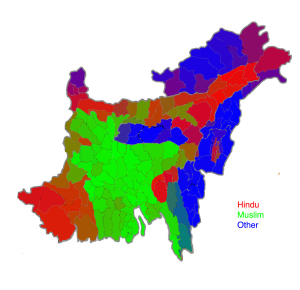 I was emailing with a friend of mine about population genetic history and Southeast Asia. I mentioned offhand that there is an east to west cline of Tibeto-Burman ancestry in Bengal. He expressed surprise, assuming Partition had scrambled everything.
I was emailing with a friend of mine about population genetic history and Southeast Asia. I mentioned offhand that there is an east to west cline of Tibeto-Burman ancestry in Bengal. He expressed surprise, assuming Partition had scrambled everything.
As most readers of this weblog know, Partition was less traumatic for Bengal than it was for Punjab. The violence was less extreme, and the population movement also not as massive. And yet looking at the religious map it is clear that some sorting has occurred. The proportion of Hindus in the region that is now Bangladesh has gone from ~25% to about 10% over the past 70 years, or three generations. Though some of this is due to differences in fertility, the main driver has been migration of Hindus out of East Pakistan, and later Bangladesh. In contrast, there has not been much of a reciprocal migration of Muslims into Bangladesh.
This results in a peculiarity when I receive genotypes from people of Bengali origin: a large minority of people of Hindu background mention that one or both of their parents have origins in eastern Bengal, what is not Bangladesh. In contrast, I have never received a gentoype from someone who tells me that their family migrated from western Bengal into Bangladesh.
The genetic consequence is simple: there is a larger variance of East Asian ancestry in West Bengal than East Bengal because of more mixing in the west than the east. In contrast, one could probably infer the extent of the migration simply by doing genetic analysis and not looking at Census data!
 Another BP Podcast is up. You can listen on
Another BP Podcast is up. You can listen on